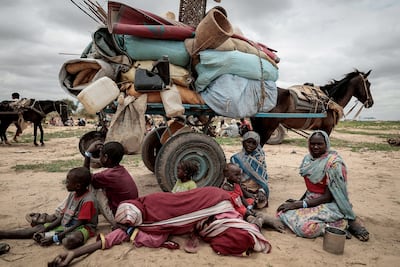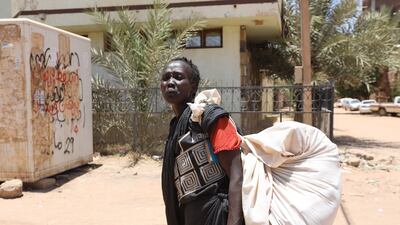Sudan’s army on Tuesday said its troops had regained control of the national radio and TV headquarters from the rival Rapid Support Forces paramilitary.
The announcement signals the latest and most symbolically significant battlefield victory in the army's continuing offensive in Omdurman, a city across the Nile to the west of Khartoum and part of the capital’s greater area.
The complex was seized by the RSF last year in the early days of its war against the army, as the paramilitary quickly took over the city’s only international airport, presidential palace and other important sites, including ministries, arms depots and factories.
An army statement did not give details of the fighting over the media complex, which lies near the centre of the capital and houses several historical sites. It is also the main stronghold in the capital of Umma, Sudan’s largest political party.
However, the army posted online videos of its troops celebrating inside the complex with celebratory gunfire, as well as scenes of street battles with the sound of heavy machinegun fire ringing out.
There was no immediate comment from the RSF on the fate of the complex.

Tuesday’s fighting came a day after the Sudanese army rejected a call for a ceasefire during Ramadan, which began on Monday, saying it intended to continue to fight.
The call for a ceasefire came in a resolution drafted by the UK and adopted on Friday by the UN Security Council. It also urged the warring parties to enable the delivery of humanitarian aid to millions of Sudanese in need.
A series of ceasefires brokered by Saudi Arabia and the US soon after the war broke out in April 2023 were short-lived or ignored.
Osman Al Mirghany, a prominent Sudanese analyst and editor of daily Khartoum newspaper Al Tayyar, said the army’s rejection of a ceasefire was rooted in preventing the RSF from using it to reinforce its most vulnerable positions or redeploy its fighters advantageously as it did during previous pauses in hostilities.
“More importantly, the army is regaining the initiative in the capital and is on the offensive," he told The National. "Accepting a truce will disrupt that and give the RSF a chance to regroup.”
The war between the army, led by Gen Abdel Fattah Al Burhan, and the RSF, led by his former ally Gen Mohamed Dagalo, began in April. Differences between the two generals over the details of Sudan’s democratic transition boiled over into violence after weeks of mounting tension.

The fighting has to date displaced nearly eight million people and created a major humanitarian crisis in which, according to the UN, at least 25 million people across the country and neighbouring South Sudan and Chad are struggling with soaring rates of hunger and malnutrition due to the war.
The violence has also destroyed large parts of the capital and left its infrastructure and services in tatters. It has spread to the western regions of Darfur and Kordofan and more recently to Al Jazeerah, the nation’s breadbasket south of the capital.
Both the army and the RSF have been found by the UN to have committed war crimes in the conflict, with the RSF blamed for ethnically motivated killings in Darfur, sexual assaults in Khartoum and using human shields.
The army is accused of air strikes and heavy artillery fire on densely populated areas, a tactic that has killed hundreds of civilians in Khartoum alone.

The humanitarian crisis caused by the war is at its worst among the millions of internally displaced Sudanese.
Sulaima Ishaq, a prominent women’s rights campaigner and political activist, is a native of Omdurman, who last year joined tens of thousands of Sudanese who took refuge in Kosti, a White Nile-side city south of the capital. Many of the displaced in Kosti live in school buildings.
“It’s not as bad in Kosti as it is the west of the country, but there are many cases of severely malnourished children and recently born infants in the city’s hospitals," she told The National on Tuesday.
“Hungry mothers have no breast milk for their infants.”

